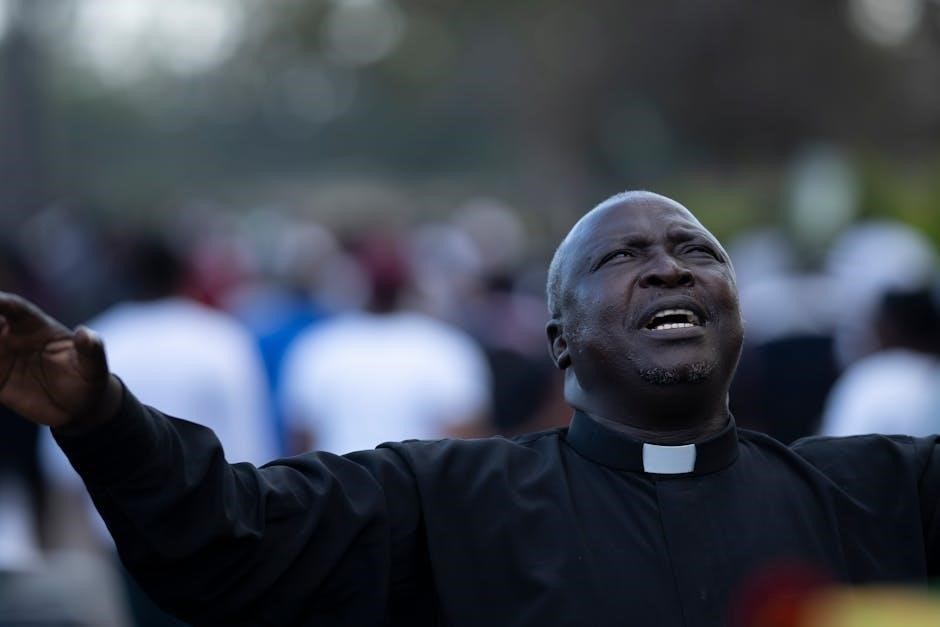Guide Me, O Thou Great Jehovah is a beloved hymn rooted in deep spiritual longing, offering solace and strength through its powerful lyrics and melody․

1․1 Historical Background of the Hymn
“Guide Me, O Thou Great Jehovah” was written by William Williams, a Welsh Methodist preacher, in 1745․ The hymn reflects Williams’ deep spiritual devotion and his extensive travels as a minister․ Its origins are rooted in the evangelical revival of the 18th century, emphasizing trust in divine guidance․ The hymn became a cornerstone in Black Gospel music, resonating with themes of resilience and hope․ Its rich theological depth and emotive lyrics have made it a cherished piece across generations, bridging traditional and contemporary worship practices․ The hymn’s enduring legacy highlights its universal appeal and spiritual significance․
1․2 Significance in Black Gospel Music
“Guide Me, O Thou Great Jehovah” holds profound significance in Black Gospel music, embodying themes of hope, resilience, and divine guidance․ Its adoption by African American communities reflects the shared experiences of journeying through life’s challenges․ The hymn’s emphasis on trust in a higher power resonated deeply during times of oppression and struggle․ It became a source of comfort and strength, often sung in churches and spiritual gatherings․ The hymn’s ability to transcend denominational boundaries has made it a unifying force, celebrating faith and perseverance․ Its inclusion in Black Gospel traditions underscores its enduring relevance and emotional impact․

Lyrical Analysis of “Guide Me, O Thou Great Jehovah”
Guide Me, O Thou Great Jehovah lyrically expresses trust in God’s guidance, acknowledging human weakness and divine strength, with vivid imagery symbolizing spiritual nourishment and journey․
2․1 Breakdown of the First Verse
The first verse of Guide Me, O Thou Great Jehovah begins with a plea for divine guidance, addressing God as a mighty redeemer․ The line, “Pilgrim through this barren land,” evokes imagery of a journey through hardship, emphasizing the believer’s vulnerability․ The phrase, “I am weak, but Thou art mighty,” highlights the contrast between human frailty and divine strength, fostering trust in God’s power․ The repetition of “Bread of heaven, Feed me till I want no more” serves as a metaphor for spiritual nourishment, reflecting a deep longing for eternal fulfillment and sustenance through faith․
2․2 Interpretation of the Second Verse
The second verse of Guide Me, O Thou Great Jehovah delves deeper into the theme of divine provision and guidance․ The line, “Open now the crystal fountain, whence the healing stream doth flow,” symbolizes spiritual renewal and purification․ The imagery of the “fiery, cloudy pillar” alludes to God’s presence in the wilderness, offering both protection and direction․ This verse reinforces the idea of reliance on God’s providence, especially in times of uncertainty․ It serves as a testament to the enduring hope and trust in divine deliverance, resonating deeply within the Black Gospel tradition as a source of comfort and inspiration․
2․3 Theological Depth in the Chorus
The chorus of Guide Me, O Thou Great Jehovah embodies profound theological richness, particularly in its repetition of “Bread of Heaven, feed me till I want no more․” This phrase symbolizes a deep yearning for spiritual nourishment and sustenance, reflecting the believer’s dependence on God․ The “Bread of Heaven” imagery evokes Christ as the source of eternal life, drawing parallels to the Eucharist and the manna provided to the Israelites in the wilderness․ The chorus underscores themes of trust, divine provision, and the sufficiency of God’s grace, making it a powerful expression of faith and reliance on His strength․
The Role of the Hymn in Black Gospel Tradition
Guide Me, O Thou Great Jehovah holds a cherished place in Black Gospel music, serving as a powerful anthem of hope and resilience within African American communities and churches․ Its rich theological themes resonate deeply, providing comfort and spiritual strength, and it has been a cornerstone in worship and cultural expression for generations․
3․1 Influence on Black Gospel Artists
Guide Me, O Thou Great Jehovah has profoundly influenced Black Gospel artists, inspiring renditions that blend traditional and contemporary styles․ Its powerful lyrics and soaring melody have been embraced by iconic voices like Mahalia Jackson, who delivered soul-stirring performances․ The hymn’s themes of divine guidance and resilience resonate deeply, making it a staple in repertoires of gospel choirs and soloists․ Many artists have adapted it to reflect personal and communal struggles, infusing it with emotional depth․ Its versatility allows for arrangements ranging from a cappella to full orchestral accompaniments, ensuring its relevance across generations in the Black Gospel tradition․
3․2 Notable Performances and Adaptations
Notable performances of Guide Me, O Thou Great Jehovah include powerful renditions by legendary gospel artists like Mahalia Jackson and Aretha Franklin․ These iconic voices brought the hymn to life with their unique interpretations, blending traditional gospel with soulful expression․ The hymn has also been adapted by contemporary Black Gospel choirs, incorporating modern instrumentation and harmonies while preserving its spiritual essence․ Additionally, it has been featured in various worship services and concerts, showcasing its enduring appeal․ These performances and adaptations highlight the hymn’s versatility and its ability to transcend generations, remaining a cherished piece in the Black Gospel tradition․
3․3 Cultural Significance in the African American Community
Guide Me, O Thou Great Jehovah holds profound cultural significance in the African American community, serving as a spiritual anthem that resonates deeply with themes of faith and resilience․ Rooted in the tradition of Black Gospel music, the hymn has been a source of comfort and hope, particularly during times of struggle and perseverance․ Its powerful lyrics and soaring melody have made it a staple in African American churches, where it is often sung with heartfelt emotion․ The hymn’s message of divine guidance and strength continues to inspire and uplift, bridging generations and fostering a sense of communal faith and identity․

Theological Themes in “Guide Me, O Thou Great Jehovah”
The hymn explores themes of divine guidance, human weakness, and God’s provision, emphasizing trust in Jehovah’s strength and the nourishment of faith through the “Bread of Heaven;”
4․1 Trust in Divine Guidance
The hymn profoundly expresses trust in divine guidance, reflecting the believer’s reliance on Jehovah’s strength amid life’s challenges․ The lyrics, “I am weak, but Thou art mighty; Hold me with Thy powerful hand,” underscore a deep dependence on God’s sovereignty․ This theme resonates deeply in Black Gospel music, where trust in divine guidance is often a source of hope and resilience․ The hymn’s emphasis on seeking God’s lead aligns with the community’s historical struggles and their faith in a deliverer․ William Williams’ original text, written during his extensive ministry, mirrors his own trust in God, making it a timeless anthem of faith and surrender․
4․2 Themes of Weakness and Divine Strength
The hymn vividly contrasts human frailty with divine omnipotence, as seen in the lines, “I am weak, but Thou art mighty․” This duality resonates deeply in Black Gospel music, where acknowledging human limitations invites divine intervention․ The plea, “Hold me with Thy powerful hand,” reflects a surrender to God’s strength, offering solace in times of struggle․ This theme is particularly poignant in the African American experience, where faith has historically been a source of resilience․ William Williams’ lyrics, shaped by his evangelical zeal, emphasize reliance on divine power, making the hymn a powerful expression of trust and surrender in the face of adversity․
4․3 Symbolism of the “Bread of Heaven”
The phrase “Bread of Heaven” in the hymn serves as a powerful symbol of divine provision and spiritual nourishment․ It evokes imagery of God’s sustaining grace, akin to the manna He provided to the Israelites in the wilderness․ In the context of Black Gospel music, this theme resonates deeply, offering hope and reassurance of God’s faithfulness, especially in times of hardship․ The repetition of “Feed me till I want no more” underscores a longing for spiritual fulfillment and reliance on divine strength․ This imagery has become a cornerstone of worship, reminding believers of God’s unwavering care and provision․

The Hymn’s Connection to the Civil Rights Movement
The hymn became an anthem of hope during the Civil Rights Movement, offering spiritual strength and resilience to activists․ Its themes of divine guidance and deliverance resonated deeply, providing comfort and motivation to those fighting for justice and equality․
5․1 Use in Spirituals and Protest Songs
The hymn “Guide Me, O Thou Great Jehovah” found profound expression during the Civil Rights Movement, serving as both a spiritual and protest song․ Its lyrics, rich with themes of divine guidance and strength, resonated deeply with activists facing oppression․ The song’s call for deliverance and sustenance mirrored the community’s plea for justice and equality․ Sung during marches and gatherings, it became a source of collective hope and resilience, bridging the gap between traditional spirituals and modern protest music․ Its powerful message uplifted those in the struggle, reinforcing their faith in a higher purpose and the eventual triumph of righteousness․
5․2 Inspiring Hope and Resilience
The hymn “Guide Me, O Thou Great Jehovah” has long been a beacon of hope and resilience, particularly within the African American community․ Its stirring lyrics, which emphasize trust in divine guidance and strength, have provided comfort and courage in times of adversity․ The song’s imagery of journeying through a “barren land” and being sustained by the “Bread of Heaven” resonated deeply with those enduring hardship and injustice․ By reaffirming faith in a mighty and providential God, the hymn inspired perseverance and hope, becoming an anthem for those seeking deliverance and a brighter future․
5;3 Modern-Day Relevance
“Guide Me, O Thou Great Jehovah” remains a powerful hymn in contemporary times, resonating with its themes of divine guidance and strength․ Its message of hope and resilience continues to inspire modern social justice movements, echoing the struggles and triumphs of the Civil Rights era․ The hymn’s call for sustenance and protection aligns with the ongoing quest for equity and justice, making it a timeless anthem for communities navigating adversity․ Its enduring relevance underscores the universal human need for faith and perseverance, ensuring its place in the spiritual and cultural fabric of today’s world․
Guide Me, O Thou Great Jehovah stands as a timeless anthem, bridging historical faith with modern inspiration, offering hope and resilience to diverse communities globally․
6․1 Enduring Legacy of the Hymn
Guide Me, O Thou Great Jehovah has left an indelible mark on Christian worship, transcending cultures and generations․ Written by William Williams in 1745, its timeless message of trust in divine guidance resonates deeply․ The hymn’s adoption in Black Gospel music highlights its universal appeal, adaptations enriching its emotional depth․ Its theological richness continues to inspire hope and resilience, making it a cornerstone in worship traditions․ Modern renditions ensure its relevance, connecting historical faith with contemporary spirituality, solidifying its place as a cherished hymn for generations to come․
6․2 Impact on Contemporary Worship
Guide Me, O Thou Great Jehovah continues to resonate powerfully in contemporary worship, bridging traditional and modern styles․ Its timeless themes of divine guidance and strength inspire modern congregations, making it a staple in many worship services․ The hymn’s adaptability to various musical interpretations has allowed it to thrive in diverse cultural contexts, including Black Gospel traditions․ Its emotional depth and theological richness create a connection with worshippers, fostering a sense of community and shared faith․ As a result, it remains a beloved choice for both personal reflection and communal praise, ensuring its enduring relevance in today’s evolving worship landscape․

Leave a Reply